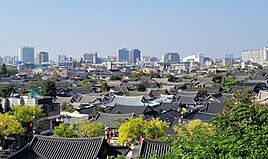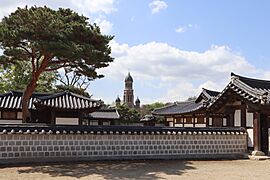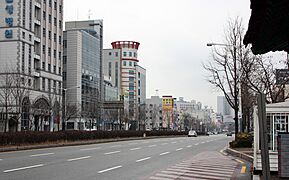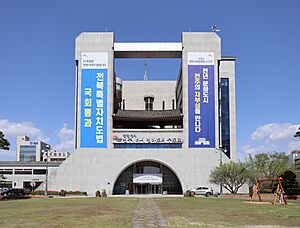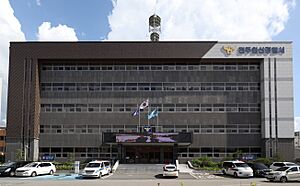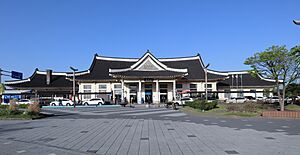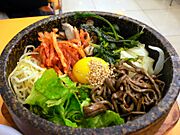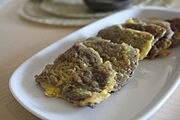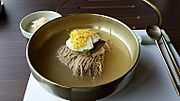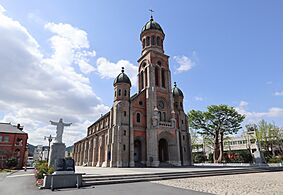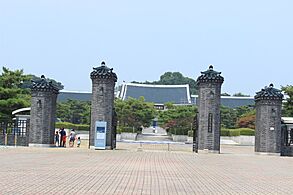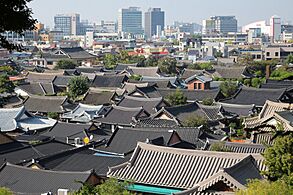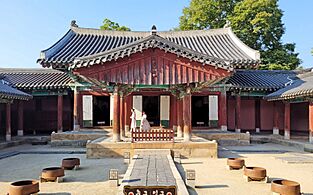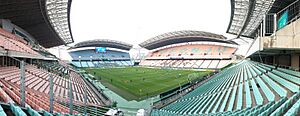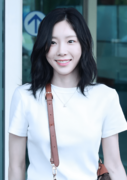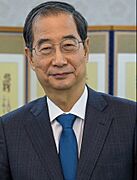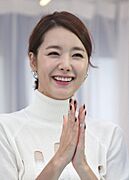Jeonju facts for kids
Quick facts for kids
Jeonju
전주시
|
|||
|---|---|---|---|
| Korean transcription(s) | |||
| • Hangul | 전주시 | ||
| • Hanja | 全州市 | ||
| • Revised Romanization | Jeonju-si | ||
| • McCune-Reischauer | Chŏnju-si | ||
|
Jeonju Hanok Village
Jeonju National Museum
Pungnammun
Gyeonggijeon
Jeondong Cathedral
|
|||
|
|||
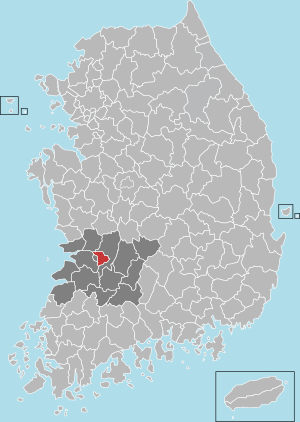
Location in South Korea
|
|||
| Country | |||
| Region | Honam | ||
| Administrative divisions | 2 Gu, 40 dong | ||
| Government | |||
| • Type | City government | ||
| Area | |||
| • Total | 206.22 km2 (79.62 sq mi) | ||
| Population
(November, 2022)
|
|||
| • Total | 652,392 | ||
| • Density | 3,164/km2 (8,190/sq mi) | ||
| • Dialect | Jeolla | ||
| Time zone | UTC+9 | ||
| ZIP codes |
560011-561870
|
||
| Area Code | +82-63-2xx | ||
Jeonju (Korean: 전주, Korean pronunciation: [t͡ɕʌɲ.d͡ʑu]) is a big city in South Korea. It is the capital of North Jeolla Province. The name Jeonju means "Perfect Region" in Korean.
Jeonju is a mix of city life and nature. This is because Wanju County, which is mostly countryside, surrounds it. Many people from Wanju County work in Jeonju.
This city is a popular place for tourists. It is famous for its delicious Korean food, old buildings, fun sports, and exciting festivals.
In 2012, Jeonju became a UNESCO Creative City for Gastronomy. This means it's recognized for its amazing traditional cooking. People have passed down these recipes for thousands of years! The city also has food research and trains talented chefs. It hosts special food festivals too.
Jeonju has a long history, over 1,300 years old. Many smart scholars have come from here. It also has a well-developed publishing industry.
Contents
City Views
Jeonju has many interesting sights. You can see traditional houses and modern streets.
- Gallery
Geography and Climate
City Divisions
Jeonju is split into two main areas called wards: Deokjin-gu and Wansan-gu. These wards are then divided into about 40 smaller neighborhoods.
Jeonju's Weather
Jeonju has four clear seasons: spring, summer, fall, and winter.
- Winter can be cool or very cold. Sometimes, cold air comes from Siberia.
- Summer is humid, with moisture coming from Southeast Asia. This happens from June to September.
- Spring (late April to May) and Fall (late September to October) are usually pleasant. Temperatures are often around 20-25°C, and it's not too humid.
| Climate data for Jeonju (1991–2020 normals, extremes 1918–present) | |||||||||||||
|---|---|---|---|---|---|---|---|---|---|---|---|---|---|
| Month | Jan | Feb | Mar | Apr | May | Jun | Jul | Aug | Sep | Oct | Nov | Dec | Year |
| Record high °C (°F) | 18.3 (64.9) |
22.9 (73.2) |
28.2 (82.8) |
31.2 (88.2) |
35.1 (95.2) |
35.8 (96.4) |
38.6 (101.5) |
38.9 (102.0) |
35.5 (95.9) |
31.5 (88.7) |
28.0 (82.4) |
23.0 (73.4) |
38.9 (102.0) |
| Mean daily maximum °C (°F) | 4.8 (40.6) |
7.5 (45.5) |
13.0 (55.4) |
19.7 (67.5) |
25.0 (77.0) |
28.4 (83.1) |
30.6 (87.1) |
31.3 (88.3) |
27.4 (81.3) |
21.7 (71.1) |
14.4 (57.9) |
7.1 (44.8) |
19.2 (66.6) |
| Daily mean °C (°F) | 0.0 (32.0) |
2.0 (35.6) |
6.8 (44.2) |
12.9 (55.2) |
18.5 (65.3) |
22.8 (73.0) |
26.2 (79.2) |
26.5 (79.7) |
21.9 (71.4) |
15.4 (59.7) |
8.8 (47.8) |
2.2 (36.0) |
13.7 (56.7) |
| Mean daily minimum °C (°F) | −4.3 (24.3) |
−2.8 (27.0) |
1.4 (34.5) |
6.9 (44.4) |
12.7 (54.9) |
18.2 (64.8) |
22.7 (72.9) |
22.9 (73.2) |
17.4 (63.3) |
10.1 (50.2) |
3.9 (39.0) |
−2.1 (28.2) |
8.9 (48.0) |
| Record low °C (°F) | −17.1 (1.2) |
−16.6 (2.1) |
−12.2 (10.0) |
−3.9 (25.0) |
2.2 (36.0) |
8.2 (46.8) |
12.1 (53.8) |
12.5 (54.5) |
4.0 (39.2) |
−2.7 (27.1) |
−8.4 (16.9) |
−15.0 (5.0) |
−17.1 (1.2) |
| Average precipitation mm (inches) | 26.9 (1.06) |
36.8 (1.45) |
53.7 (2.11) |
78.4 (3.09) |
82.8 (3.26) |
159.0 (6.26) |
302.8 (11.92) |
289.6 (11.40) |
128.2 (5.05) |
57.3 (2.26) |
49.8 (1.96) |
34.0 (1.34) |
1,299.3 (51.15) |
| Average precipitation days (≥ 0.1 mm) | 8.3 | 6.9 | 9.4 | 8.7 | 8.9 | 10.3 | 16.0 | 15.0 | 9.3 | 6.6 | 8.9 | 9.0 | 117.3 |
| Average snowy days | 8.3 | 5.0 | 2.3 | 0.2 | 0.0 | 0.0 | 0.0 | 0.0 | 0.0 | 0.0 | 1.4 | 7.2 | 24.4 |
| Average relative humidity (%) | 66.8 | 63.5 | 60.9 | 59.1 | 63.2 | 70.6 | 77.5 | 76.9 | 73.4 | 69.4 | 67.4 | 67.6 | 68.0 |
| Mean monthly sunshine hours | 151.2 | 162.3 | 191.7 | 209.7 | 220.5 | 168.1 | 133.1 | 153.1 | 169.6 | 198.7 | 158.1 | 142.9 | 2,059 |
| Percent possible sunshine | 48.7 | 51.3 | 50.1 | 53.9 | 50.0 | 39.6 | 30.8 | 38.4 | 45.1 | 55.6 | 50.0 | 47.0 | 46.2 |
| Source: Korea Meteorological Administration (percent sunshine 1981–2010) | |||||||||||||
Jeonju's Long History
Jeonju has a very old history, going back over 1,300 years.
Ancient Times
Jeonju was part of the Baekje kingdom, which was in southwestern Korea. It is thought that Jeonju started as a market town around 57 BC.
In 660 AD, the kingdom of Silla took over Baekje, including Jeonju. Jeonju then became an important provincial capital for Silla.
Later, around 889 AD, people started to revolt because of high taxes. A powerful rebel leader named Gyeon Hwon made Jeonju his main base. In 892 (or 900), he renamed the city Wansan and made it the capital of his new kingdom, Later Baekje.
Gyeon Hwon fought against Silla. In 927, he attacked Silla's capital and its king. But then, Wang Geon from the Goryeo kingdom fought Gyeon Hwon. Wang Geon won, and Jeonju surrendered to him in 935.
Goryeo and Joseon Dynasties
Under the Goryeo rule, Jeonju became a provincial capital again. It grew steadily and became richer. In 1182, there was a short rebellion by peasants and soldiers, but it was quickly stopped.
In 1392, the Joseon dynasty took over from Goryeo. The Joseon family considered Jeonju their ancestral home. During this time, Jeonju became the capital of the Jeolla province. In 1413, Jeonju was one of four cities chosen to keep copies of the Annals of the Joseon Dynasty, which are still around today.
Modern Jeonju
In 1894, the city was taken over during the Donghak Peasant Revolution. From 1910 to 1945, Jeonju was under Japanese rule. The Japanese destroyed the old city walls, and only the Pungnammum Gate is left.
Jeonju grew a lot between 1925 and 1949, reaching 100,000 people. It became a metropolitan city in 1935 and a formal city in 1949. During the Korean War, Jeonju was not on the main battle lines, but it still suffered from bombings. Many men from the city fought in the war.
In 1963, Jeonju got its current borders and government. It has grown quickly since then. Unlike some other big Korean cities, Jeonju doesn't have a lot of heavy industries. Today, traditional tourism and sightseeing are very important for the city.
Public Services
Fire Stations
Jeonju has several fire stations to keep everyone safe:
- Seobu 119 Safety Center
- Jeonju Wansan Fire Station
- Kyodong Fire Station
- Jeonju Deokjin Fire Station
Libraries
Jeonju has many libraries where you can read and learn:
- Jeonju City Library
- Rainbow Small Library
- Gunji Library
- Geumam Library
- Sinseo-dong Library
- Peace City Library
- A-joong Library
- Ongdalsaem Small Library
- Hyoja library
- Nosongjakeun Library
- Samcheon Public Library
Education
Jeonju is home to two public universities:
- Jeonbuk National University
- Jeonju National University of Education
Transportation
You can get around Jeonju using city buses and taxis. Many tourist spots are close to each other, so walking is also a great way to explore!
Railways
- Jeonju Station
Buses
- Jeonbuk Shuttle Bus
Culture and Fun Things to Do
Delicious Food
Jeonju is famous for its amazing food!
- Jeonju bibimbap (전주비빔밥) is a very popular traditional dish. It's a mix of rice, vegetables, meat, and a spicy sauce. There are also great vegetarian restaurants serving Jeonju-style food.
- Kongnamul gukbap (콩나물국밥) is a warm rice soup with bean sprouts. It's perfect for winter!
- Yukjeon (육전) is a type of pancake made with baked meat and dough.
- Memil naengmyeon (메밀냉면) is a refreshing cold noodle dish.
Top Attractions
Jeonju has many cool places to visit and exciting events:
- Jeonju International Film Festival happens every year from late April to May. It's a week-long celebration of movies!
- National Jeonju Museum shows off ancient items from the Baekje kingdom.
- You can explore royal museums, temples, and a castle fortress on a hillside. There's also a famous paper museum that even has an annual paper fashion show!
- Jeonju Hanok Village (Hanok Maeul) is a special village in the city center. It has over 800 traditional "hanok" style buildings. You can find traditional tea shops, souvenir shops, and restaurants there.
- Jeongdong Catholic Church is a beautiful old church built between 1908 and 1914. It's on a spot where Korean Catholic martyrs were honored. This church is a recognized national treasure.
- Jeonju International Sori Festival is a music festival that has been named one of the best international festivals!
- Gyeonggijeon is a special place that keeps a portrait of Lee Sunggye, who was the first king of the Joseon dynasty.
- The local mountains and parks are great for outdoor fun. The city also has a zoo, a park, and the Hanguk Sound and Culture Hall, which is a big concert hall.
- Attractions in Jeonju
Sports in Jeonju
Jeonju is home to a professional football (soccer) team called Jeonbuk Hyundai Motors. They play in the K League 1, which is the top league in South Korea. Their home stadium is the Jeonju World Cup Stadium.
There's also a semi-professional football team, Jeonju Citizen, that plays in the K4 League. Their home ground is the Jeonju Sports Complex Stadium.
Jeonju used to have a professional basketball team, the Jeonju KCC Egis, but they moved to Busan in 2023.
Famous People from Jeonju
Many talented people come from Jeonju!
Politicians
- Han Duck-soo, a former prime minister of South Korea.
Celebrities
- Defconn (born Yoo Dae-joon 1976), a rapper and TV personality.
- Lee Min-woo (born 1979), a singer and member of the group Shinhwa.
- Kim Kyu-jong (born 1987), a singer and member of the group SS501.
- Yoon Kyun-sang (born 1987), an actor.
- Taeyeon (born Kim Tae-yeon 1989), a singer and member of the famous group Girls' Generation.
- Kim Sung-kyu (born 1989), a singer and member of the group Infinite.
- Hwasa (born 1995), a singer and member of the group Mamamoo.
- Wheein (born 1995), a singer and member of Mamamoo.
- Choi Yu-jin (born 1996), a singer and member of the groups CLC and Kep1er.
- Choi Byung-chan (born 1997), a singer and member of the group Victon.
- Bae In-hyuk, (born 1998), an actor.
- Na Jae-min (born 2000), a singer and member of the group NCT.
- So Yi-hyun (born 1984), an actress.
- Lee Yoo-mi (born 1994), an actress.
Athletes
- Lee Chang-ho (born 1975), a professional Go player (Go is a strategy board game).
- Yang Hong-seok, (born 1997), a basketball player.
- Notable people of Jeonju
Sister Cities
Jeonju has special partnerships with other cities around the world. These are called sister cities:
 San Diego, California, United States
San Diego, California, United States Suzhou, Jiangsu, China
Suzhou, Jiangsu, China Kanazawa, Ishikawa, Japan
Kanazawa, Ishikawa, Japan Antalya, Turkey
Antalya, Turkey Mokpo, South Jeolla, South Korea
Mokpo, South Jeolla, South Korea
See also
 In Spanish: Jeonju para niños
In Spanish: Jeonju para niños
 | Aurelia Browder |
 | Nannie Helen Burroughs |
 | Michelle Alexander |


